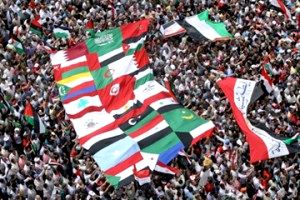
Which, in general, is not surprising. As we know, Arab nationalism was a romantic anti-colonial movement of the army elite who, impregnated with Western ideas, sincerely believed that with the establishment of European government institutions, standards of living would also automatically rise to European levels (still, however, an important factor in the spread of Arab nationalism in the middle of the last century was the creation in the region of the Israeli national state, however, this is a topic for another discussion).
Pro-Western military romantics did not understand that, unlike in Europe (and Israel for that matter), Arab nationalism is a classical “chimera.” After all, tribal identities completely dominated the ruins of the former Ottoman Empire in the middle of the last century and therefore the conditions did not exist for bourgeois revolutions, and, consequently, the creation of nation-states.
Therefore, Nasser, Gaddafi, Hussein and Assad Sr.’s pursuit of statism, secularism and decolonisation was profoundly alien to the general population and these countries’ streets only remained calm while there was a global confrontation between Moscow and Washington.
With the collapse of the bipolar world and, correspondingly, the withdrawal of support for nationalists from their main ally in the region – the Soviet Union – the Arab nation-states have become, in effect, an “abandoned geopolitical field.” In addition, the defeats in three Arab-Israeli wars, in which the nationalist regimes played a leading role on the Arab side, made the apologists for nationalism extremely unpopular on the Arab streets.
As a result, at the end of the last century a course was taken towards the ideology of the Cold War’s victor – Western-style liberalism. But this path did not sit well with the Arab world. As a result, in the last few years Islamists led by Qatar and Saudi Arabia have tried to fill the ideological vacuum.
However, as I have already said, in those Arab states where over decades they have become accustomed to secular living, there are increasing fears of the spread in their territory of the Wahhabi model of society which is characteristic of the main integrators of the Arab world; and that is leading to noticeable diminishment of the integration drive on the part of Doha and Riyadh.
Thus, the main instigators of the Arab Spring, who inflicted a devastating blow to the institution of the nation-state in the region, currently are unable to offer the Arab world the promised “new Caliphate.”
And this means that, most likely, with the destruction of the Arab nation-states we will not see an Arab EU analogue emerge, but a “large Arab Somalia.”
In general, people are speaking more and more of the “Somalisation” of the Greater Middle East in recent times. And there is good reason for this.
There is the “parade of autonomy” in Iraq, starting with Saladin Province two years ago, followed by Basra, Fallujah, Diyala, Nineveh and other cities. Then there is the question of the proclamation of independence of the so-called Republic of Iraqi Kurdistan and the establishment of the Western Kurdistan autonomous region in the North of Syria, close to the border with Turkey.
And it goes without saying that many decisions taken by the Cyrenaica People’s Congress that took place in the outskirts of Benghazi concerning the creation of Barca Federal Union District were worrying, as was the anti-government uprising in Bani Walid as well as the autonomist sentiments in Misrata, Sabha and other parts of Libya.
The nature of what is happening in these regions demonstrates that all these autonomous regional trends and the weakening of the national governments is more clearly following not the path of European regionalism, or as some researches have suggested – “glocalization,” i.e. a specific local response to the process of gobalization (the term coined by British sociologist Roland Robertson), but rather the return to banal tribal identities. That is to say, a clearly typical tribalization of the Greater Middle East.
It is on the European continent that the current globalization processes may lead to (and this still remains a big question) the implementation of the concept of European regions in the spirit of traditional German geopolitics – from the Central European project of Pastor Friedrich Naumann to the pan-regional ideas of Karl Haushofer to Carl Schmitt’s concepts of large spaces, proposing full integration, real self-governing territories, the cooperative nature of central and regional relations, subsidiarity, solidarity, the recognition of the historical development of regions’ specific cultural characteristics, social orientation, the priority of regional authorities and trans-border cooperation.
In the Arab Ecumene the destruction of the nation-state is a direct path to archaism of the region, it’s “Somalisation” and permanent inter-tribal clashes in the fight for natural resources.
However, it is possible that “the powers that be” are counting on this. Indeed, the tribalization of the hydrocarbon-rich Arab world is the dream of any energy importer, as negotiating with the leader of some “local-area” tribe, which owns significant oil or gas resources and is not burdened with national problems, is much easier.
However, it remains to be seen whether European energy importers have taken into account all the risks, as well as the now obsessive overseas strategy of curbing China’s geopolitical ambitions.
The notorious “theory of controlled chaos” in the Middle East Ecumene could fail after all with fatal consequences that go far beyond the region.
Vitaly Bilan, Candidate of Historical Sciences and an expert on the Middle East, еxclusively for the online magazine “New Eastern Outlook”.
